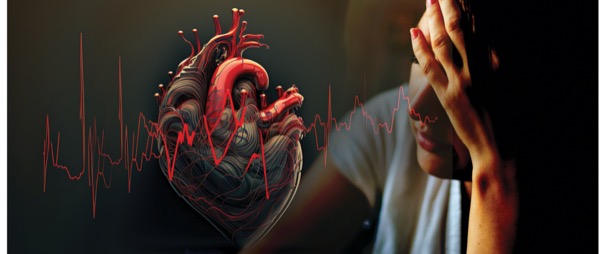DENVER—One of the most debilitating symptoms of inflammatory bowel disease, fatigue has been found to be correlated with lower heart rate variability, according to a study presented at the 2023 Crohn’s and Colitis Congress.
After controlling for other contributors, the investigators found that patients with IBD and lower HRV reported more significant global fatigue and impact of fatigue on daily functioning.
“Overall, these findings suggest that lower HRV increases physical feelings of fatigue and reduces the ability to manage fatigue impacts,” said lead investigator Josie McGarva, MA, a graduate research coordinator at Northwestern Medicine, in Chicago. “Increasing HRV through resonance frequency breathing could be a way to improve fatigue symptoms and management in IBD.”
As Ms. McGarva reported, HRV is a measure of the normal change in time between each heartbeat and is a proxy measure of vagus nerve function, a key component of the gut–brain axis. Low HRV has been associated with an increased risk for cardiovascular events and greater vulnerability to the effects of psychological stress (Curr Cardiol Rev 2021;17[5]:e160721189770; Neurosci Biobehav Rev 2012;36[2]:747-756).
Although vitamin and mineral deficiencies, depression, poor sleep, and inflammation can contribute to fatigue, Ms. McGarva said, patients still struggle with this symptom even when these factors are under control.
For this study, Ms. McGarva and her co-investigators recruited adults from an outpatient IBD clinic to wear a Fitbit Inspire 2.0 for 14 days to monitor nighttime total time asleep, restlessness (measured by the number of ~30-second awakenings) and HRV. Participants completed the IBD Fatigue Scale and Harvey-Bradshaw Index (HBI) or Simple Clinical Colitis Activity Index (SCCAI) at baseline, week 1 and week 2. Baseline laboratory testing was conducted for C-reactive protein (CRP), vitamins B12 and D, and ferritin.
Pervasive Fatigue, Even in Remission
The interim analysis showed that the average patient HVR was 31.79, which is below the published normative average of 42, and the rate ranged from 19 to 75 (abstract 16). Investigators observed no differences in HRV based on sex or IBD type, but, as expected, HRV decreased with age.
As Ms. McGarva reported, patients slept an average of 6.6 hours per night and had 24.1 awakenings per night, which is considered normal according to Fitbit data.
“All participants reported having fatigue, and 44% of them met criteria for severe fatigue based on the IBD Fatigue Scale, despite 75% of the sample being in remission based on their self-report measures,” she said.
The study also found that increasing levels of fatigue were related to higher CRP (r=0.29), higher scores on the HBI/SCCAI (r=0.62) and more time asleep (r=0.20) but not to restlessness or iron levels.
“When controlling for confounding variables like CRP, disease activity, time asleep and age, we found a correlation between lower HRV and increased fatigue [P=0.041],” Ms. McGarva said. The investigators didn’t find a relationship between fatigue and restlessness, vitamins B12 or D, or ferritin levels.
While the study is still in progress, HRV may be a possible intervention point for IBD-related fatigue, Ms. McGarva said. She noted that types of deep diaphragmatic breathing such as resonance frequency breathing or a yoga breathing practice called adham pranayama are known to improve vagal tone (Neurosci Biobehav Rev 2022;135:104576) and, therefore, could be one way to increase HRV.
“Physicians can recommend resonance frequency breathing to their patients as a safe and effective way to manage their symptoms, without the need for medication or other medical interventions,” Ms. McGarva said.
HRV Also Linked to Flares
Elizabeth Ann Spencer, MD, an assistant professor of pediatrics and gastroenterology at the Icahn School of Medicine at Mount Sinai, in New York City, noted that changes in HRV have been linked to flares (Inflamm Bowel Dis 2021;27[10]:1576-1584; Neurogastroenterol Motil 2016;28[11]:1655-1662).
“Studies have shown the same change in HRV when patients with IBD have a flare,” Dr. Spencer said. “Perhaps it is just a flare that is driving patient fatigue and driving their heart rate variability?”
Ms. McGarva responded that “this could be the case in some of our patients, but according to their self-reported measures on HBI and SCCAI, a significant percentage of patients were in remission.”
She added that “HRV can help expand our window of tolerance to stress and trauma. Training this part of our body can be helpful for so many things.”
—Chase Doyle
Ms. McGarva and Dr. Spencer reported no relevant financial disclosures.
{RELATED-HORIZONTAL}

